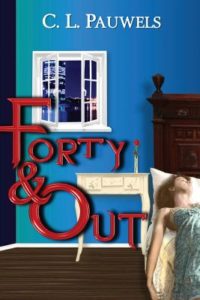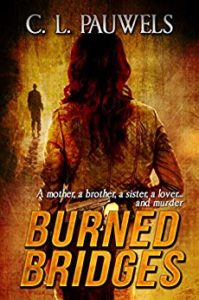An Interview with C.L. Pauwels
 C. L. Pauwels is a woman of many talents: author, teacher, editor, writers’ workshop assistant director, literary citizen, mother, grandmother, and wife to name a few. She’s also on a mission to make a positive impact on this world and not just with her writing: Pauwels is passionate about healthcare, equal rights, and climate change and is very involved with her local government. Her writing repertoire is just as diverse as her interests, spanning everything from short stories to essays to novels, and her work can be found many places in print and online. Her fiction includes the novels Forty & Out and Burned Bridges, and she is most likely working on new pieces as we speak. I’ve known C. L. for a few years now, and I’m always impressed by the number of projects she’s juggling, so I’m eternally grateful that she was able to answer a few of my questions.
C. L. Pauwels is a woman of many talents: author, teacher, editor, writers’ workshop assistant director, literary citizen, mother, grandmother, and wife to name a few. She’s also on a mission to make a positive impact on this world and not just with her writing: Pauwels is passionate about healthcare, equal rights, and climate change and is very involved with her local government. Her writing repertoire is just as diverse as her interests, spanning everything from short stories to essays to novels, and her work can be found many places in print and online. Her fiction includes the novels Forty & Out and Burned Bridges, and she is most likely working on new pieces as we speak. I’ve known C. L. for a few years now, and I’m always impressed by the number of projects she’s juggling, so I’m eternally grateful that she was able to answer a few of my questions.
Christina: One of your social media sites features a quote by FDR that reads: “The test of our progress is not whether we add more to the abundance of those who have much; it is whether we provide enough for those who have little.” How do you think that writers can help provide for those who don’t have enough?
C. L.: In my experience, writers share widely: we teach, we mentor, we pass along books, we support libraries. All those things help in a very practical sense. And studies show that reading makes us better thinkers, more compassionate, and all-around better human beings. So by producing those wonderful, inclusive worlds to share with readers everywhere, we encourage that process while providing insight and perspective, important social commentary and information, and entertainment and inspiration–all through our words on the page! How great is that?
Christina: You have a nontraditional writing background and have played many non-writing roles over the years. Has writing always been a part of your life, or did it emerge over time?
C. L.: Is there such a thing as a “traditional” writing background? Hmm . . .
I don’t remember when I started putting words on the page. I remember my mother reading to me when I was very young, so the love of books was always a part of my life. When my grandfather died, Nana sent me a small three-ring binder where he’d collected all sorts of little poems and stories I’d apparently sent him over the years. And in third grade, somehow I was tapped to write a play for the class to perform at Parents’ Day. I’m sure my teacher must have helped, and I wish I had a copy of that script! One of my poems was posted on the bulletin board in sixth grade, I published my first short story in 1989 (at 31), and my first novel in 2014 (you do the math!).
That’s the long answer. Short answer: as you can see, while writing has been with me for many, many years, it’s emerged slowly over time as well. A true writing dichotomy, and characteristic of the creative “overnight success.”
Christina: Does writing energize you or exhaust you? And when you aren’t writing, is there another creative endeavor that keeps you occupied?
C. L.: Yes; yes; and sort of? To be more specific, I think writing itself energizes me, avoiding writing (which I’m very good at) is exhausting, and I can always find something else that needs my attention that may or may not be considered creative. For one, I bake all our bread; it’s my therapy. And while much of my work is creative per se, I far too easily avoid my current WIP by writing in social media (WAY too much), or writing/reading/editing for one of my several part-time jobs/clients/students.
Christina: Your novels, Forty & Out and Burned Bridges are both mysteries set in Toledo. Why Toledo? And will you be branching out to other settings with future novels?
C. L.: In the early days, I took to heart the “write what you know” adage, and I loved mysteries, so the criminal justice community of Toledo became my setting. My self-proclaimed “Toledo Trilogy” (#3 is in major rewrite stage) has been in the works for a long, long time. Forty & Out grew out of a short story I published while living and working in the Toledo area in 1990, and is actually the second novel I completed. The first (which is now #3 noted above), became my master’s thesis in 2010. Burned Bridges was written because, hey, mysteries are always in a series, right? And part of the rewrite of #3 is adapting a Toledo-area novel to the other two story lines–not an easy job, I’m learning!
I have a fourth (actually written third) novel, another crime novel but with an amateur this time (a hacker!) that is set in Dayton and Yellow Springs, Ohio, where we live now. I’m in awe of people who create whole worlds in fantasy or science fiction; I need to stick with settings I know. Fatal Errors is with an agent now–fingers crossed!
Christina: Was there anything that you’ve edited out of a novel that you think could be used for anything else?
C. L.: So many darlings I’ve slain that reside in miscellaneous folders on my hard drive! One or two have made it to short stories; one actually snuck back into a later novel, and the rest are still in limbo, possibly never to see the light of day.
Christina: If you could be a literary character, who would you be and why?
C. L.: Sherlock Holmes (minus the opium, I think), for the “game is afoot”? Kinsey Millhone, to learn what would happen in “Z”? Yes, I cried when Sue Grafton died. Melrose Plant (from Martha Grimes’ Richard Jury series), who is wealthy, confident, and “a keen observer of human nature.” He helps solve the crimes while enjoying life to its fullest.


You can find C.L. in multiple places!
Website: https://clpauwels.com/
Instagram: @cyndil00who
Twitter: @clpauwels
Thanks to C.L. for agreeing to this interview! If you know of an author who’d like to be featured in an interview (or you are an author who would like to be featured), feel free to leave a comment or email me via my contact page.
